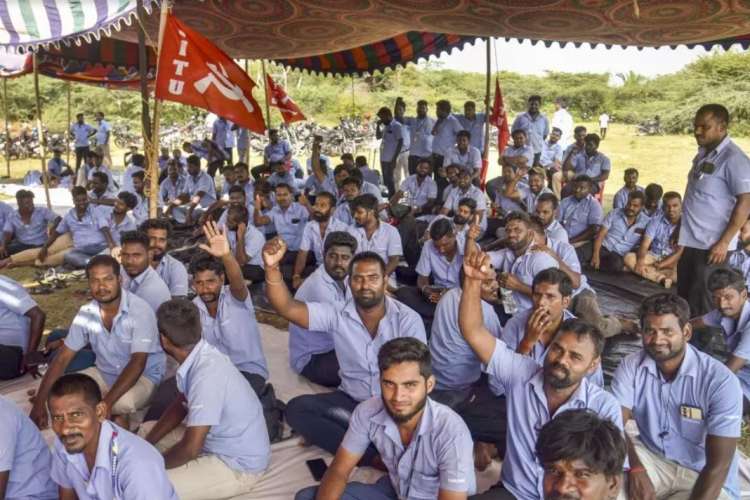The protest at Samsung’s Tamil Nadu factory has now entered its fourth week. No resolution is in sight as workers continue to demand better wages and reasonable working hours. They are also calling for more frequent breaks without being penalised by management. On July 8 this year, employees of Samsung Electronics’ Tamil Nadu unit decided to form a union with the assistance of the Centre of Indian Trade Unions (CITU). The newly formed Samsung India Workers’ Union (SIWU) has expressed solidarity with thousands of South Korean colleagues who have been on an indefinite strike against the tech giant for similar reasons.
SIWU turned to street protests only after their demands went unheard, seeking, among other things, official recognition of their union. Around 1,000 workers from the multinational company’s manufacturing unit in Sriperumbudur, Tamil Nadu, have refused to return to work until their demands are met. Their primary demand is the immediate approval of their proposal to form a union, which has been pending with the Tamil Nadu labour department since July 25.
READ | Edible oils mission seeks to end import dependence
Instead of addressing these concerns, workers were met with hostility, and nearly 900 of them were detained by Tamil Nadu Police for allegedly causing public inconvenience. Samsung India, for its part, has stated that it is willing to negotiate wages and other demands with the striking workers but not with a union affiliated with CITU.
Labour practices at Samsung under a cloud
Poor working conditions, especially at multinational corporations, remain a persistent issue. A few months ago, a similar situation arose at Amazon’s Manesar facility in Haryana, where workers complained of long hours with few or no breaks, along with low wages. A young EY accountant recently collapsed and died, allegedly due to the unbearable work pressure. While many MNCs have established operations in India, labour rights activists allege that some underpay and overwork their Indian employees, often colluding with state governments to suppress workers’ rights.
In the 1970s and 1980s, worker protests were common in the country’s industrial hubs, driven by politically connected labour unions. However, such strikes in the pre-liberalisation era contributed to the decline of several manufacturing centres in cities like Kanpur, Kolkata, and Punjab. It was for these reasons that corporations shifted operations to more business-friendly states like Gujarat, Tamil Nadu, and Karnataka.
Samsung began manufacturing in India in Noida in 1996, following the liberalisation policies introduced by the Narasimha Rao government. In the 18 years since Samsung started its India operations, this is the first time it has encountered labour unrest. The ongoing strife threatens to damage Tamil Nadu’s efforts to establish itself as a preferred investment destination for companies.
Samsung is one of the 20 largest companies globally. However, its workers say the company does not even provide a living wage that keeps pace with the rising cost of living.
Millions of Indian workers join trade unions, often supported by left-leaning political parties. These unions use their political influence to enforce labour laws and advocate for better working conditions. Their primary aim is to ensure that foreign companies operating in India comply with local labour laws and prioritise worker welfare.
While the government continues to attract multinational giants by offering favourable business conditions and lenient labour laws, it cannot afford to ignore workers’ concerns. India has long been an attractive destination for global companies due to its cheap labour, but the government has a duty to enact effective labour laws to ensure that foreign investment does not come at the cost of worker wellbeing. Both central and state governments must work towards establishing a better mediation system to resolve labour disputes.
As India aims to expand its manufacturing base and position itself as an alternative manufacturing hub to China, resolving labour disputes with minimal disruption is crucial. India urgently needs a balanced and supportive environment for both corporations and workers. Formulating comprehensive labour laws that strike a fair balance between the interests of both sides is the first step. Currently, labour laws are heavily skewed in favour of businesses, a situation that could lead to greater challenges in the future.

